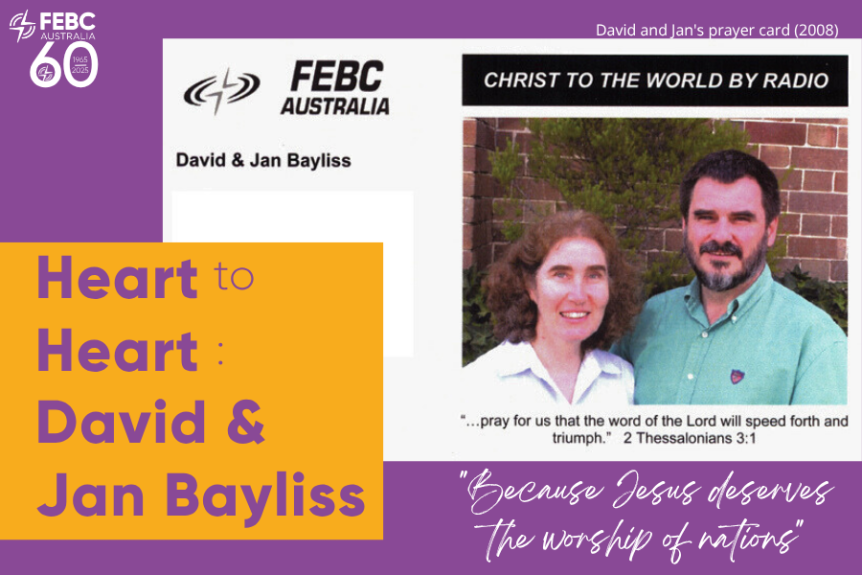For David and Jan, what began as a match of complementary skills—his heart for China and technical expertise, her passion for the gospel and teaching abilities— turned into 20 years of broadcasting hope across Asia. Their journey with FEBC spans dramatic technological transitions, from massive shortwave antennas to digital studios, while maintaining one constant: staying "close to the listener" in sharing God's love.
Missionaries: David and Jan Bayliss
Dates of service: 1994–2013
Locations: Saipan, the Philippines, Mongolia, Singapore, Australia
Roles: Broadcast Engineer (David); Trainer, Correspondent, Creative Programmer and others (Jan)
What drew you both to FEBC?
David had a heart for China and technical skills, while I had a passion for the gospel and teaching abilities. We were searching for a ministry that could use both our gifts. FEBC's shortwave broadcasts reached both Russia and China, making it a perfect fit for our calling.
What was the scope of the ministry during your time in Saipan?
KFBS Saipan was broadcasting from three massive curtain antennas in approximately 30 languages, reaching from Eurasia and Asia. We broadcast overnight, timing transmissions to reach listeners at appropriate hours. Major Chinese dialects had multiple daily hours, while some minority languages received just thirty minutes weekly.
What was life like at the Saipan station?
Saipan is a small tropical island. It was an ideal training ground for engineers, operating in English and maintaining high technical standards. Our 12-15 missionaries lived on a 20-acre compound on northern cliffs, surrounded by jungle scrub and small farms. A twenty-minute walk down a rough coral road brought you to a beach on the sheltered western side. But walking back up that road would undo the benefits of a cooling swim. Our boys loved the freedom of being barefoot island kids. We carpooled to Saipan Community School, near our local radio station KSAI, which served the island's 60,000 residents.
On the downside, we were in the middle of 'Typhoon Alley' and experienced typhoons (cyclones) each year. Sometimes these were very destructive and could take us off air for weeks at a time.
Can you share a powerful testimony of impact?
Two stories stand out. First, a community leader of another faith positioned radios in mosques and schools to hear our broadcasts because he believed Jesus was Al-Masih (the Messiah). Some of the leaders in that faith began incorporating our messages into their teaching. Every time we put those programs on air, we prayed for those groups of listeners.
The second involves B*, a young man from an upper-caste background in South Asia who wrote to us for years in the Philippines, initially just collecting QSL cards (a favourite hobby for shortwave listeners to show they have written to stations. The term ‘QSL’ comes from the international Q code and means ‘I confirm receipt of your transmission’. A QSL card is, therefore, a written confirmation).
We were airing news, popular music, and anything topical that related to listeners. Anyone who listened knew we had something to do with Jesus. Some listeners were Christians, but most weren't. And in the mailbag, we would get questions, such as questions on life. Listeners who wrote were invited to take part in correspondence Bible Studies. I was involved in the Audience Relations department when B began writing.
We wrote back and forth, and B later joined Bible Studies. It took B years before he truly understood that Jesus was the only God. His family disowned him, but he was keen to follow Jesus at any cost. Years later, I was conducting a First Response Radio training in India when I unexpectedly met him as a FEBC volunteer. He had married and was hoping that with the birth of his little boy, his family would be reconciled. He never gave up on his faith. He considered Jesus his 'pearl of great price'.
How did your roles evolve over the years?
In Manila, David led the digitalisation of studios across Asia, transitioning from reel-to-reel tapes to digital systems. He travelled extensively - Korea, Taiwan, Cambodia, Thailand. After this we went to Mongolia where the idea was that David was to build the capacity of the local staff; to train them so they weren't just following instructions, but that they would learn and get a qualification themselves. Finally, we went to Singapore as part of the International Office. David was the engineering resource available for short term help to all of the South East Asian fields.
At one stage, I (Jan) worked with the Overseas English department from Manila, primarily broadcasting to India, providing alternative news sources and Christian content when India had limited radio options. My role change was from scheduling programs to air in Saipan, to writing features, on-air hosting and Audience Relations follow-up in Manila, training people in radio programming for community development in Mongolia and then to Singapore to provide that kind of creative programming support for our Asian fields.




